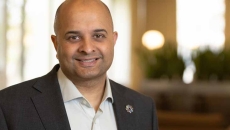AI & ML Intelligence
AI & ML Intelligence
In the test, 74% of clinicians said the ambient and genAI technology reduced their levels of burnout and 95% wanted to continue using the technology. Further, clinicians used 25 non-English languages.
AI & ML Intelligence
The CAIO should not just understand both of those disciplines, but intuit what AI is good and bad, what's scalable and whether it's the right fit, says Sameer Sethi, the New Jersey health system's chief AI and insights officer.
AI & ML Intelligence
Chief Data and AI Officer Mouneer Odeh says work on artificial intelligence is like a snowball going downhill – over the next five to 10 years it will build and build until the scale of the impact meets what healthcare requires.
AI & ML Intelligence
The University of California at San Francisco's overarching goal was not to replace human judgment but to enhance it – allowing oncologists to focus on personalized treatment rather than spending valuable time retrieving and verifying information.
AI & ML Intelligence
The kidney care provider's build-not-buy effort has shown great results: 30-day readmissions are down 36%, hospitalizations among high-risk patients are down 49% and optimal starts are up 67%.
AI & ML Intelligence
Tom Kiesau, chief innovation officer and leader, digital and technology transformation, at healthcare consulting firm Chartis, discusses his vision of AI that includes the aging population, clinical and operational AI, AI operating models and much more.
AI & ML Intelligence
But barely 1 in 10 are properly investing in the infrastructure necessary to support enterprisewide deployments, according to its new research report. An Accenture health analyst unpacks its findings.
AI & ML Intelligence
Once the AI was implemented with several accounts, the tool codified 99% of medications, 85% of sigs and 96% of allergies, Wise's director of operations and finance reports. It's an almost complete prevention of unmatched or invalid medications.
AI & ML Intelligence
Artificial intelligence agents coordinating tasks across healthcare workflows were the talk of HIMSS25. In the year ahead, AI is expected to progress cautiously beyond ambient listening to effect new automation in electronic health records.
AI & ML Intelligence
REM sleep behavior disorder almost always is an early sign of Parkinson's or dementia, often preceding other symptoms by 10-15 years. Researchers think the tool can enable development of new therapies for those diseases.









